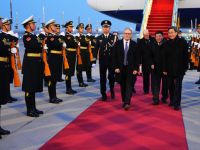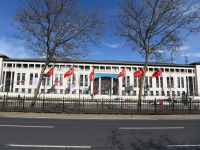Prime Minister Ali Abul Ragheb on Sunday said his government is working to achieve an economic growth rate of 3.5 percent for this year, up from the previous average of 2 percent.
“During the past four years, the growth rate has been modest, hovering between 2 percent and 2.5 percent, “ Abul Ragheb said in his first press conference since taking office in June.
“And we plan to make the figure exceed 5 percent in the future and propel the economy,” said the premier, who stressed that improving the economic situation tops his government's agenda.
“One of the priorities is boosting the economic situation through attracting investments, and working on increasing exports and domestic production,” he added.
In this respect, he said, “there have been efforts to boost exports to the Palestinian self-ruled areas, Iraq and other Arab countries, mainly Syria, especially in light of the reactivation of the Jordanian-Syrian Higher Committee, which agreed on a number of aspects of cooperation.”
In mid-August, Jordan and its northern neighbor held high-level talks in Damascus and signed a higher committee protocol paving the way for a free trade agreement.
Abul Ragheb said that economic sectors such as tourism had witnessed a boom in revenues, adding that investments were on the rise, especially around the Dead Sea and Aqaba.
According to official figures, tourist arrivals soared by 10 percent in the first quarter of this year compared to the same period of 1999. The Tourism Ministry anticipates that this year's revenues will jump to $1 billion from the $900 million earned in 1999.
He also said that efforts were under way to complete infrastructure projects in order to lure more investors to the country.
The premier further stressed that there would be no increase in fuel prices this year, but added that international oil prices had been rising. In addition, he continued, the matter would be settled in meetings with Iraqi officials.
“The issue depends on the prices we will agree on with the Iraqi government upon the renewal of the Jordanian-Iraqi oil deal by the end of this year,” said the premier.
This year's bilateral oil agreement amounted to $740 million, of which $300 million worth is being provided free of charge by Iraq. Iraq is charging $19 per barrel for the remainder.
If the two sides apply the international price of oil, the Kingdom's oil bill will exceed $900 million.
“But we hope there will be no increase,” commented Abul Ragheb.
Official sources said that International Monetary Fund (IMF) representatives would visit the Kingdom by the end of this year to set up a pricing strategy for oil and oil derivatives.
As for the annual salary increase for civil servants, Abul Ragheb said that a raise was on the agenda, but added that other incentives had not been discussed.
“This is due to the circumstances of the economic adjustment program and the commitment that the agreed-upon deficit would not exceed the envisaged figure of 7 percent for 2000,” he said.
As for next year, Abul Ragheb said the government anticipated a 1 percent drop in its deficit, when budget deficit should not exceed 6 percent.
“We do not know whether there will be a substantial increase in civil servants' salaries; that will be defined in light of revenues and expenditures,” he added.
As for the Kingdom's foreign debt which is a burden on the budget, Abul Ragheb said it stood at $7.5 billion. He put the country's internal debt at JD1.1 billion.
“Through the IMF-backed adjustment program, we hope to cut the deficit, improve revenues, control expenditures and reschedule, sell debts,” said the premier.
He said these measures would help to ensure that the debt would not affect government spending, especially capital
expenditures.
While noting that certain economic sectors were flourishing, the premier acknowledged a weak performance by others, mainly agriculture, transport and construction.
As for the nation's bourse, Abul Ragheb said, “unfortunately, the bourse has struggled for the last three years. But this does not mirror the improvement in economic situation.”
The prime minister added that a committee has been set up recently to improve the bourse. ― ( Jordan Times )
By Rana Awwad
© 2000 Mena Report (www.menareport.com)







